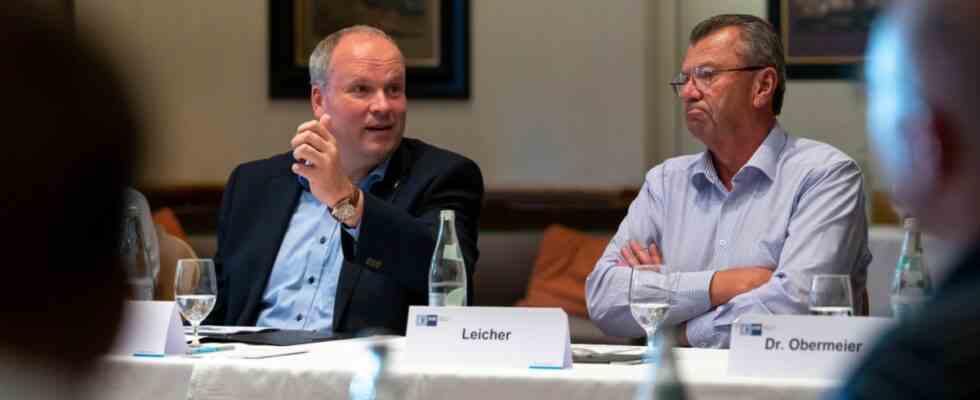In Aying, at first glance, there is little sign of all the crises in the world these days. The beer garden in front of the Bräustüberl is just as full on this Thursday afternoon as the local brewery’s storage tanks, from which the blond beer comes that the let visitors taste. But in the ballroom in the neighboring brewery inn – where there is only water to drink – the mood is a bit gloomy. District Administrator Christoph Göbel (CSU) came at the invitation of the regional committee of the Chamber of Industry and Commerce (IHK) for the district of Munich to provide answers to the big questions for the district at this time – and maybe to give the economy some hope after all. But Göbel, who describes himself as an “unreasonable optimist,” says he’s becoming more pensive these days – and looking ahead to autumn and winter worries him. “I hope the worst-case scenarios won’t happen.”
The district of Munich is basically far removed from the “word case”, in no other region of the republic is the economy booming at the highest level like here. Göbel also attests the district “full employment”, “extremely high prosperity” prevails despite all the crises, and “great prosperity” can be recorded. This is the stocktaking of entrepreneurs who have a large part in this development, as the district administrator emphasizes. But what could people expect in the short term, what can companies expect? “In the short term,” says Göbel, “we are facing a veritable energy crisis.” The district administrator is already at the gas storage tanks, which are not as easy to fill as the Ayinger beer tanks.
Place of serious debates: This time the IHK regional committee met in Aying.
(Photo: Sebastian Gabriel)
Local politics only has a limited influence on the flow of gas, but if too little energy arrives in Germany, municipalities and districts will feel the consequences, and Göbel makes no secret of that. But first, according to the district administrator, people and companies would be hit hard by an energy crisis. If energy were to be regulated and allocated quotas, which must be assumed at the moment, many people would have a “liquidity problem”; even those who own property, but even more so those without their own house or apartment, according to the district administrator. In addition, there are also many marginally employed people in the district of Munich – keyword: full employment. And what rising energy prices and quotas for gas mean for the labor market, the district administrator does not hide either: “The consequence then is for the companies: costs go down. And that then goes to the staff.”
Cities and municipalities should cushion
Of course, he cannot say for sure whether all of this will happen, the district administrator said. The consequences for the district as the responsible authority would be very clear. “When times are difficult, our social responsibilities increase and our income as a district decreases.” The cities and municipalities would also have to cushion this development directly and would probably also have to struggle with reduced income from trade tax. Ultimately, according to Göbel, he hopes that the only thing left to talk about is rising costs.
“It’s deep,” says Christoph Höhler, head of the IHK for the district and entrepreneur from Kirchheim. He himself sees his task as providing politicians with direct feedback from entrepreneurship. But the IHK also deals with other, economically and socially relevant issues. For example, how to reconcile environmental and climate protection and competitiveness. Florian Schardt, member of the IHK regional committee and leader of the SPD parliamentary group in the district council, reports that internally there is definitely a struggle about how progressive the IHK should position itself on this question. With a new position paper, she has already dared to go far, according to the Social Democrat, who also emphasizes how important it is to deal with the issue of the shortage of skilled workers both in business and in politics. The district office and the district council would do everything in their power in consensus.
And yet the topic of energy security and gas supply overshadows everything, even at the level of medium-sized companies. It is undisputed within the IHK that the three nuclear power plants still connected to the grid must continue to run; a position that District Administrator Göbel shares only to a limited extent, as he believes their contribution would be too small. His focus is on his own riding anyway, and so he makes it clear which resources the district of Munich must rely on: “Geothermal energy, gravel, solar – and wind.”

